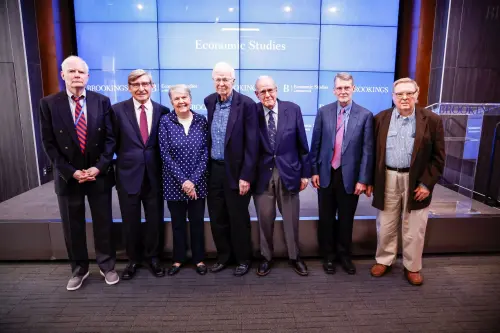Report Summary
The goal of Restoring Order is to raise awareness about practical solutions to legislative dysfunction through the development and dissemination of a report that addresses five major pillars of reform: regular order, deliberation, oversight, corruption, and enforcement. The project is directed by congressional scholars Norman Ornstein (American Enterprise Institute) and Thomas Mann (Brookings Institution), both members of the Institute’s Advisory Board.
Regular Order refers to the set of rules, norms and practices that facilitate the orderly conduct of business in a legislature. Needed changes include restoring transparency and accountability to the legislative process, imposing a waiting period on bills reported to the floor so that members have time to read them before voting, allowing the minority party to introduce amendments, and opening the doors to the minority in conference committees that are currently a closed-door process. The House of Representatives’ three hour vote on the Medicare prescription drug bill, a vote that was supposed to take fifteen minutes, is one example of the collapse of the regular order; the refusal to consider meaningful amendments to the bankruptcy bill in either the House or Senate, and the sharp expansion in the House of closed rules banning all amendments for consideration, and of “self-executing rules,” that waive all points of order before any consideration of a bill, are others.
Deliberation in committee, on the floor, and in conference, is essential to lawmaking. Committees need more scope to scrub legislative proposals. Members and their staff need more time to review the details of legislation before the vote is called on the floor. More genuine debate needs to occur at every level of the legislative process. The Medicare bill and the Patriot Act were among the major bills pushed through Congress without much debate and deliberation either in committee or on the floor. The same has been true of the massive budget packages the past few years.
Oversight of the executive is essential to our system of checks and balances. Congress needs to monitor major policies of the administration and its agencies before public outcry for a reversal on policy ensues. The failure of either chamber to do any meaningful oversight of the Department of Homeland Security or its component parts, such as FEMA, contributed to the failure to respond to Katrina. This lack of congressional oversight allows for a continued failure to provide interoperable communications to first responders facing another terrorist attack or natural disaster. The Dubai Ports debacle and the White House wiretapping program are additional examples of the need for congressional oversight
Corruption undermines the integrity and legitimacy of government. Steps need to be taken to thwart the undue influence of special interests and lobbyists on the policy making process through earmarking, the solicitation of campaign funds, and the provision of benefits in return for a sympathetic hearing on Capitol Hill. From the famed “bridge to nowhere” in Alaska, a $230 million earmark tacked onto the transportation bill by Alaska’s senior Senator per the request of special interest groups, to the action taken by House Appropriations Committee Chair Jerry Lewis that resulted in a windfall for a New York investment firm shortly after it held a fundraiser bringing in $150,000 for his leadership PAC, examples of corruption big and small, legal and illegal, abound.
Enforcement is essential if existing and new laws and rules are to have any force. New mechanisms are needed in both the House and Senate to investigate and enforce ethics rules and lobbying laws without the inherent conflict of interest plaguing the House and Senate Ethics Committees. To this day, the House Ethics Committee remains in a partisan stalemate over ethics investigations related to the former Majority Leader.



